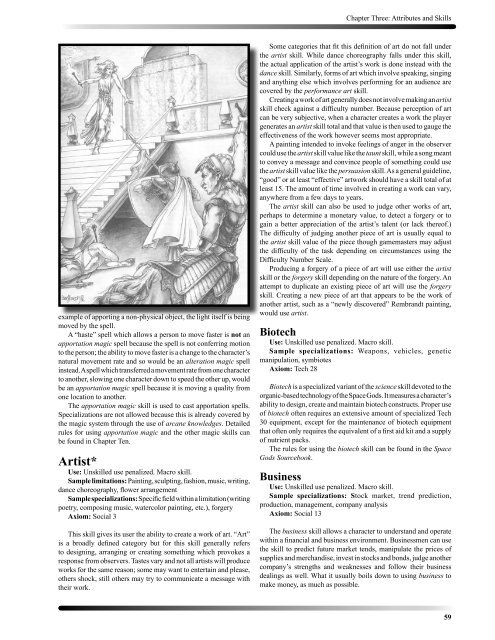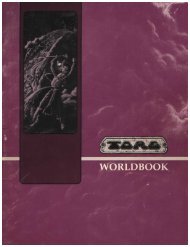Torg Player Rules
Torg Player Rules
Torg Player Rules
You also want an ePaper? Increase the reach of your titles
YUMPU automatically turns print PDFs into web optimized ePapers that Google loves.
example of apporting a non-physical object, the light itself is being<br />
moved by the spell.<br />
A “haste” spell which allows a person to move faster is not an<br />
apportation magic spell because the spell is not conferring motion<br />
to the person; the ability to move faster is a change to the character’s<br />
natural movement rate and so would be an alteration magic spell<br />
instead. A spell which transferred a movement rate from one character<br />
to another, slowing one character down to speed the other up, would<br />
be an apportation magic spell because it is moving a quality from<br />
one location to another.<br />
The apportation magic skill is used to cast apportation spells.<br />
Specializations are not allowed because this is already covered by<br />
the magic system through the use of arcane knowledges. Detailed<br />
rules for using apportation magic and the other magic skills can<br />
be found in Chapter Ten.<br />
Artist*<br />
Use: Unskilled use penalized. Macro skill.<br />
Sample limitations: Painting, sculpting, fashion, music, writing,<br />
dance choreography, flower arrangement<br />
Sample specializations: Specific field within a limitation (writing<br />
poetry, composing music, watercolor painting, etc.), forgery<br />
Axiom: Social 3<br />
This skill gives its user the ability to create a work of art. “Art”<br />
is a broadly defined category but for this skill generally refers<br />
to designing, arranging or creating something which provokes a<br />
response from observers. Tastes vary and not all artists will produce<br />
works for the same reason; some may want to entertain and please,<br />
others shock, still others may try to communicate a message with<br />
their work.<br />
Chapter Three: Attributes and Skills<br />
Some categories that fit this definition of art do not fall under<br />
the artist skill. While dance choreography falls under this skill,<br />
the actual application of the artist’s work is done instead with the<br />
dance skill. Similarly, forms of art which involve speaking, singing<br />
and anything else which involves performing for an audience are<br />
covered by the performance art skill.<br />
Creating a work of art generally does not involve making an artist<br />
skill check against a difficulty number. Because perception of art<br />
can be very subjective, when a character creates a work the player<br />
generates an artist skill total and that value is then used to gauge the<br />
effectiveness of the work however seems most appropriate.<br />
A painting intended to invoke feelings of anger in the observer<br />
could use the artist skill value like the taunt skill, while a song meant<br />
to convey a message and convince people of something could use<br />
the artist skill value like the persuasion skill. As a general guideline,<br />
“good” or at least “effective” artwork should have a skill total of at<br />
least 15. The amount of time involved in creating a work can vary,<br />
anywhere from a few days to years.<br />
The artist skill can also be used to judge other works of art,<br />
perhaps to determine a monetary value, to detect a forgery or to<br />
gain a better appreciation of the artist’s talent (or lack thereof.)<br />
The difficulty of judging another piece of art is usually equal to<br />
the artist skill value of the piece though gamemasters may adjust<br />
the difficulty of the task depending on circumstances using the<br />
Difficulty Number Scale.<br />
Producing a forgery of a piece of art will use either the artist<br />
skill or the forgery skill depending on the nature of the forgery. An<br />
attempt to duplicate an existing piece of art will use the forgery<br />
skill. Creating a new piece of art that appears to be the work of<br />
another artist, such as a “newly discovered” Rembrandt painting,<br />
would use artist.<br />
Biotech<br />
Use: Unskilled use penalized. Macro skill.<br />
Sample specializations: Weapons, vehicles, genetic<br />
manipulation, symbiotes<br />
Axiom: Tech 28<br />
Biotech is a specialized variant of the science skill devoted to the<br />
organic-based technology of the Space Gods. It measures a character’s<br />
ability to design, create and maintain biotech constructs. Proper use<br />
of biotech often requires an extensive amount of specialized Tech<br />
30 equipment, except for the maintenance of biotech equipment<br />
that often only requires the equivalent of a first aid kit and a supply<br />
of nutrient packs.<br />
The rules for using the biotech skill can be found in the Space<br />
Gods Sourcebook.<br />
Business<br />
Use: Unskilled use penalized. Macro skill.<br />
Sample specializations: Stock market, trend prediction,<br />
production, management, company analysis<br />
Axiom: Social 13<br />
The business skill allows a character to understand and operate<br />
within a financial and business environment. Businessmen can use<br />
the skill to predict future market tends, manipulate the prices of<br />
supplies and merchandise, invest in stocks and bonds, judge another<br />
company’s strengths and weaknesses and follow their business<br />
dealings as well. What it usually boils down to using business to<br />
make money, as much as possible.<br />
59



